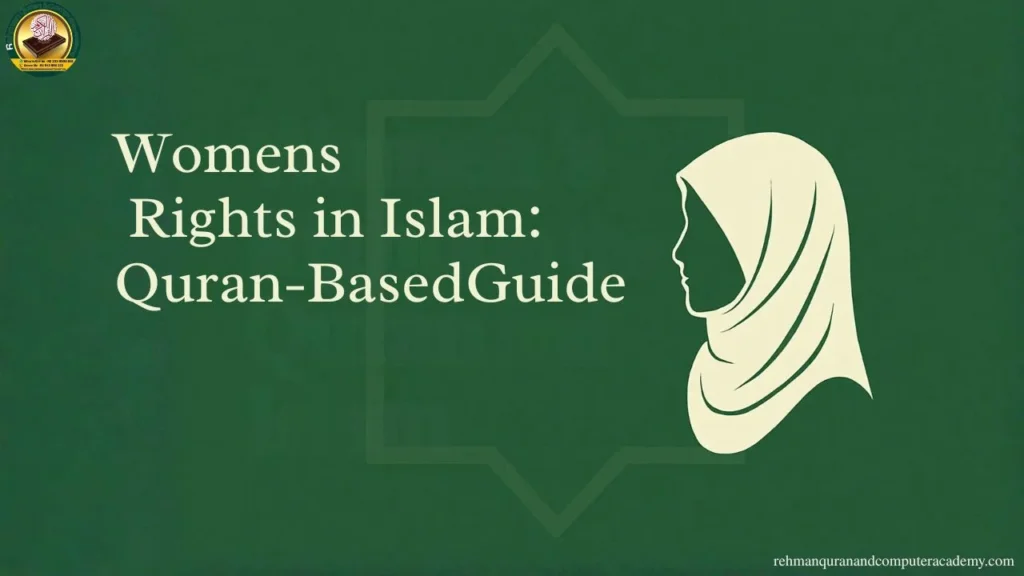
Introduction to Womens Rights in Islam
In Islam, the rights of women are deeply rooted in the Quran, Hadith, and Islamic law. These teachings of Islam provide a clear framework for the status of women in Islam, ensuring they are respected and valued. For every Muslim woman, knowing her womens rights in Islam fosters spiritual growth and strengthens Muslim communities. However, misconceptions about women in Islam often cloud these truths. At Rehman Quran and Computer Academy, we empower Muslim women through online Quran classes, Quran recitation, Quran with translation, and Islamic education. Our courses, like Quran memorization, Quran Tafseer, and Arabic course, help clarify the rights in the Quran and address myths, guiding women in the Muslim world to live confidently according to Islam.
Historical Context of Womens Rights in Islam
Pre-Islamic Arabia and Womens Status
Before Islam, women in the Muslim world faced harsh conditions. In pre-Islamic Arabia, women were considered inferior, often denied property rights or basic dignity. Practices like infanticide showed the low status of women. Islam changed this, as Islamic teachings gave women rights to inheritance, marriage consent, and respect, transforming their position of women in society. These early Islamic reforms laid the foundation for women’s Islamic rights.
Quranic Reforms for Women’s Dignity
The Quran brought revolutionary changes for women in Islam. Verses like Surah An-Nisa 4:19 emphasize fairness, granting rights to women in marriage and family life. The Quran ensures gender equality by affirming that God created men and women with equal spiritual worth. At Rehman Academy, our Quran with translation and Quran Tafseer courses help Muslim women explore these rights in the Quran, making the teachings of Islam accessible to women in the West and beyond.
Prophetic Examples Supporting Women’s Rights
The Hadith of Prophet Muhammad (PBUH) shows how Islam teaches kindness to women in Islam. For example, he said, “Be good to women” (Sahih Bukhari). These sayings guide Muslim men and women to uphold women’s rights. Our Hadith & Fiqh studies at the academy teach Muslim jurists and students how the Prophet’s actions support female rights in Islam, ensuring women’s empowerment through authentic knowledge.
Core Rights of Women in Islam
Right to Education and Knowledge
The Quran encourages all believing men and women to seek knowledge (Surah Al-Mujadila 58:11). Islam places no limits on women’s rights to education, making it a core part of Islamic society. Rehman Academy’s online Quran classes, Arabic language training, and Islamic education empower working women and others to learn Quran reading and Basic Norani Qaida. These programs support women’s empowerment by combining spiritual and practical skills for Muslim women globally.
Right to Property and Inheritance
Islamic laws on women grant property rights and inheritance, as stated in Surah An-Nisa 4:7. Unlike pre-Islamic times, women in Islam can own and manage wealth. This economic right ensures womens rights in Islam religion are upheld. Our Basic Islamic Education courses teach Muslim women how Islam permits them to manage their share of women’s inheritance, reinforcing their legal rights in Islamic jurisprudence.
Right to Consent in Marriage
In marriage in Islam, women’s rights include giving free consent, as supported by Hadith (Sahih Bukhari 7.62.67). Islam forbids forced marriages, ensuring women are given a voice. Rehman Academy’s Kalimas & Namaz and Basic Salah Course help Muslim women understand their rights and responsibilities as a husband and wife, fostering harmony in Muslim communities.
Right to Financial Independence
Islam grants women in Islam rights to financial independence. A Muslim woman can earn, own, and spend her wealth without restriction. This women’s right supports women empowerment in Islamic society. Our computer courses alongside Quran memorization enable women in contemporary settings to gain skills for financial stability, aligning with Islam’s vision for Muslim men and women.
Womens Roles in Islamic Society
Role as a Wife and Mother
In Islam, the Muslim woman as a husband and wife or mother has clear rights and responsibilities. Surah Ar-Rum 30:21 highlights mutual respect in marriage in Islam. Women are given love and protection, balancing their roles. Rehman Academy’s Quran with Tajweed and Quran memorization courses help women in Islam strengthen their faith, supporting their roles in Islamic society.
Role in Community and Leadership
Women in Islam have historically led as scholars of Islam, like Aisha bint Abu Bakr. Islam teaches that womens rights in Islam include contributing to Muslim communities. Our Islamic education courses foster leadership skills, preparing Muslim women to serve their communities while promoting gender equality in Muslim societies.
Balancing Faith and Modern Responsibilities
Muslim women today balance faith and modern life. Islam permits working women to pursue careers while upholding Islamic teachings. Rehman Academy’s online Quran reading and Arabic course offer flexible learning, helping women in the West and beyond integrate women’s Islamic rights into daily life through General Basics & Manners and Quran recitation.
Marriage and Family Rights in Islam
Rights of a Woman in Islamic Marriage
Islamic laws on women ensure rights of a woman in Islam marriage, like mahr (dowry) and mutual respect (Surah An-Nisa 4:34). Islam rights of wife include protection and kindness. Our Basic Salah Course and Hadith & Fiqh studies teach Muslim women about their legal rights, helping them build strong husband and wife relationships in Islamic society.
Divorce and Custody Rights
Divorce in Islam provides women’s rights through fair processes (Surah At-Talaq 65:1). Women are given rights to custody and support. Rehman Academy’s Quran Tafseer courses clarify these rights in Islam, addressing the issue of women in Islam and empowering Muslim women with knowledge of Islamic jurisprudence.
Addressing Misconceptions About Marriage Rights
Misconceptions about womens rights in Islam, like forced marriages, are common. Islam forbids such practices, emphasizing consent. Our interactive Islamic education courses, including Quran with translation, help Muslim women and women in the West separate cultural myths from Islamic teachings, ensuring clarity on women’s rights.
Dress Code and Modesty in Islam
Understanding Hijab and Niqab
The Quran (Surah An-Nur 24:31) outlines modesty, requiring women to wear hijab for dignity. Niqab vs hijab: A woman must cover her hair, but when can a woman take off her hijab? Only in private settings, as per Islamic law. Rehman Academy’s courses explain these rules for women in Islam.
Spiritual Significance of Modesty
Modesty in Islam is a form of worship, reflecting women’s Islamic rights. Quran recitation classes at the academy connect Muslim women to the spiritual value of hijab, deepening their faith and position of women in Islamic society.
Practical Guidance for Modest Dress
Muslim women can practice modesty with practical tips, like choosing comfortable hijab styles. Our General Basics & Manners courses guide women in Islam on aligning dress with Islamic teachings, supporting womens rights in Islam religion.
Addressing Misconceptions About Womens Rights in Islam
Common Myths and Their Refutations
Misconceptions claim women in Islam face oppression or that women are not allowed equal rights. The Quran and Hadith refute this, showing Islam gave women equal spiritual status (Surah Al-Ahzab 33:35). Quran with translation courses at Rehman Academy clarify female rights in Islam, addressing myths for secular women and others.
Women’s Rights in the Middle East vs. Islamic Teachings
Rights in the Middle East often mix cultural practices with Islamic law, causing confusion. Islam teaches equality, unlike some regional traditions. Our Europe-focused online Quran classes ensure Muslim women learn authentic rights in Islam, free from cultural distortions.
Empowering Women Through Authentic Knowledge
Rehman Academy’s Read Live Quran and Special Islamic Courses empower Muslim women by addressing misconceptions. These programs teach womens rights in Islam, helping women in contemporary settings live confidently within Islam.
Spiritual Empowerment Through Quranic Learning
Quran Memorization for Women
Quran memorization strengthens faith for Muslim women. Rehman Academy’s Quran Memorization (Hifz) course supports women in Islam to master the Quran, enhancing their status of women in Islam and spiritual connection.
Tajweed and Recitation for Confidence
Proper Quran recitation with Tajweed builds confidence. Our Quran with Tajweed classes teach Muslim women correct pronunciation, aligning with Islamic teachings and supporting women’s empowerment.
Tafseer for Deeper Understanding
Quran Tafseer explores womens rights in Islam through detailed study. Rehman Academy’s courses help Muslim women understand rights in the Quran, fostering a deeper connection to Islam.
How Rehman Quran and Computer Academy Supports Women
Flexible Online Learning for Women
Rehman Academy offers online Quran classes via Zoom/Skype, perfect for working women. Flexible schedules support Muslim women in learning Quran reading and Islamic education from anywhere, including women in the West.
Tailored Islamic Courses for Women
Courses like Kalimas & Namaz and Basic Norani Qaida cater to all levels. These programs ensure Muslim women master Islamic teachings, supporting their rights and responsibilities in Islamic society.
Combining Faith and Skills
Our computer courses alongside Quran memorization empower Muslim women with practical skills. This blend supports women’s empowerment, aligning with Islam’s vision for economic rights and growth.
Quotes and References on Womens Rights in Islam
Key Quranic Verses
The Quran highlights women’s rights, like Surah Al-Ahzab 33:35, which states God created men and women with equal spiritual value. These verses guide Muslim women in understanding their rights in Islam.
Hadith Supporting Women’s Rights
Hadith emphasize respect for women in Islam, such as the Prophet’s saying, “The best among men and women are those good to women” (Sahih Muslim). These teachings reinforce female rights in Islam.
Frequently Asked Questions About Womens Rights in Islam:
What are womens rights in Islam?
Islam grants muslim women key rights in Islam like education, property rights, and consent in marriage in Islam. The Quran and Hadith ensure women’s Islamic rights, such as financial independence and respect, promoting women’s empowerment in Islamic society.
Do men and women have equal rights in Islam?
God created men and women with equal spiritual worth, as Quranic verses like Surah Al-Ahzab 33:35 show. While Islamic law assigns different roles, gender equality is upheld, with rights in the Quran ensuring fairness for muslim men and women.
Can a wife say no to her husband in Islam?
According to Islam, a woman must be respected in husband and wife dynamics. Islamic jurisprudence allows a wife to refuse unreasonable demands, ensuring Islam rights of wife protect her dignity, as taught in Quran Translation courses.
What are the rights of a woman in Islamic marriage?
Women in Islam have legal rights in marriage in Islam, including consent, maintenance, and kind treatment. The Quran emphasizes love between husband and wife, with Quran Tafseer courses explaining these rights concerning marriage.
Did women have rights in the Islamic Golden Age?
During the early Islamic era, muslim women like Aisha (RA) enjoyed rights in Islam such as education and leadership. Muslim scholars note that Islam gave women significant women’s rights compared to other societies, as seen in Hadith & Fiqh Studies.
What does the Quran say about women’s rights?
The Quran outlines rights in the Quran for women, like property rights and respect (Surah An-Nisa 4:19). Islam teaches being good to women, and Quran Recitation helps muslim women learn these female rights in Islam directly.
Do women have rights in Islamic countries today?
Women in contemporary Muslim societies enjoy womens rights in Islam, like voting and education, though cultural practices vary. Islamic Education courses clarify Islamic teachings vs. rights in the Middle East, promoting women’s empowerment.
What are some common misconceptions about womens rights in Islam?
Misconceptions claim Islam forbids women’s freedoms, but Islamic laws on women grant economic rights and education. Quran Tafseer addresses myths like niqab vs. hijab or restrictions, showing Islam’s true view of women.
How does Islam compare to Christianity in terms of women’s rights?
Both Islam and Muslims and Christianity value women’s rights, but Islam’s teachings of Islam emphasize legal rights like inheritance. Muslim jurists and Quran Translation courses show women in Islam have unique protections compared to secular women.
Why do many women choose conversion to Islam if it’s seen as oppressive?
Western women and others choose Islam for its women’s Islamic rights, like respect and rights to women in Islamic society. Special Islamic Courses dispel misconceptions, showing how Islam permits women’s empowerment and dignity.
Call to Action: Start Your Islamic Learning Journey
Join Rehman Quran and Computer Academy to explore womens rights in Islam through online Quran classes, Arabic courses, and Islamic education. With free trials and flexible schedules, Muslim women can learn Quran recitation, Tajweed, and more. Contact us at +92 543 546 001 or Contact@rehmanquranandcomputercademy.com to begin.

